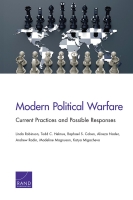 The United States today faces a number of actors who employ a wide range of political, informational, military, and economic measures to influence, coerce, intimidate, or undermine U.S. interests or those of friends and allies; many of these measures are often collectively referred to as "political warfare." This report analyzes political warfare as it is practiced today by both state and nonstate actors, and provides detailed recommendations regarding the most effective ways that the U.S. government, along with its allies and partners, can respond to or engage in this type of conflict to achieve U.S. ends and protect U.S. interests.
The United States today faces a number of actors who employ a wide range of political, informational, military, and economic measures to influence, coerce, intimidate, or undermine U.S. interests or those of friends and allies; many of these measures are often collectively referred to as "political warfare." This report analyzes political warfare as it is practiced today by both state and nonstate actors, and provides detailed recommendations regarding the most effective ways that the U.S. government, along with its allies and partners, can respond to or engage in this type of conflict to achieve U.S. ends and protect U.S. interests.
The authors examine historical antecedents of political warfare and current-day practices through in-depth case studies of Russia, Iran, and the Islamic State. They use these cases to derive common attributes of modern political warfare. The authors then identify effective means for responding to these challenges. Drawing on documentary and field research as well as extensive semistructured interviews with practitioners in the U.S. government and elsewhere, they determine gaps in practices and capabilities for addressing political warfare threats. The report concludes with recommendations for countering political warfare by creating a more effective, coordinated, and cost-sensitive approach to effective statecraft, including specific measures for the U.S. State Department and the U.S. military, particularly the special operations community.
No comments:
Post a Comment